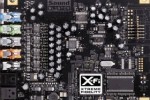The first time through I got it wrong also. I then read all the comments in the blog and listened to both a second time and still couldn’t hear the difference. Then, I listened to them the 3rd time and this time put my head exactly in the center of the 2 laptop speakers on my Toshiba — and then it became apparent. The 1st track has slightly almost unnoticable more clarity but more important it has “depth” and the second track doesn’t.
In my case I have definite hearing loss — I’ve been tested by an ear doctor and got a lot of nice looking graphs and reports. I am virtually unable to hear anything above 12Khz. (in case you ever think of having professional testing done to your own ears, don’t — it’s quite expensive and if I had known I wouldn’t have done it — but that’s another story) A few things the doctor told me that are well known in this is a) most of the population suffers hearing loss as they age, the older you get the more you lose b) hearing loss isn’t even in each ear, usually one ear is worse than the other c) high frequencies go first and it becomes very hard to discriminate as the level of background noise goes up.
 So, if your over 35 years old and you listen to these clips you simply won’t be able to hear the difference by listening for the cymbals and high frequency sound differences — physically you can’t hear them. But, you can tell if you listen for the overall sound of each clip. And secondly, if you don’t train your ear to hear the difference — you won’t be able to.
So, if your over 35 years old and you listen to these clips you simply won’t be able to hear the difference by listening for the cymbals and high frequency sound differences — physically you can’t hear them. But, you can tell if you listen for the overall sound of each clip. And secondly, if you don’t train your ear to hear the difference — you won’t be able to.
One thing I have found myself that is quite interesting is that the subconscious mind has a huge bag of tricks it uses on hearing. Besides the automatic balance compensation between different volume levels in each ear that the brain does, another thing I have found concerns memory — the subconscious will substitute what it knows your supposed to be hearing from memory. An easy way to see this is if your older, take a CD that you listened to just a few tracks on when you were young and have them memorized but haven’t listened to in years and play it in a public area where your conscious mind is partly distracted. You will notice that the tracks you have memorized on the CD sound a lot better than the tracks on the CD that you never originally listened to. Your subconscious is filling in what you can’t hear anymore with what it has in memory. It can’t do that with the tracks you never memorized so those sound duller — unless you bring your full conscious attention to all the tracks.
Thus, I suspect that if you have a library of music and you listen to it a lot and part of the time you listen to CD or other lossless recordings then very likely you will not care if you listen to the 128k bit versions if your jogging or whatever because your brain will substitute the missing bits of sound with what is in your memory. But if you never listen to the lossless versions then I suspect the flaws in the lower bitrate recordings will become magnified.
Hearing seems to be one area where the subconscious mind is doing a huge amount of preprocessing to help the conscious mind interpret sound. I’m sure this goes back millions of years where the subconscious would string together a bunch of random sounds — a snap of a stick here, a leaf rustle there — and fill in the blanks, so the conscious mind would hear this and think “I better scam I hear a tiger sneaking up on me”





